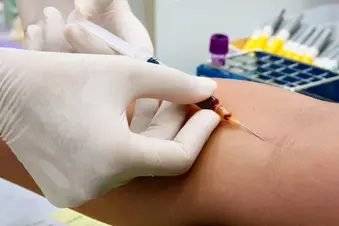
If you have hyperkalemia -- high levels of potassium -- your treatment will depend on how high your levels have risen, how quickly it happened, and whether you have serious symptoms.
Severe hyperkalemia is a medical emergency. You might need dialysis. But if it’s a mild case, you and your doctor may be able to manage it without you staying in a hospital.
The first thing your doctor will likely do is retest your potassium level to see if the first test was accurate. Blood tests will also check your kidney function. Chronic kidney disease is the most common cause of hyperkalemia.
Next, if your potassium level is high, you’ll probably get an electrocardiogram (ECG or EKG) to check your heart’s electrical activity. To do an ECG, a doctor or other health care professional will attach electrodes to your legs and chest using stickers, a process that takes a few minutes. You won’t feel a thing, and the test will be over in seconds.
Your treatment will depend on what the blood tests and ECG results show.
It’s an emergency if you have symptoms (such as severe muscle weakness, paralysis, or some types of heart rhythm problems) or if you have certain patterns on your ECG results. You’ll need urgent treatments to quickly lower your potassium level. These may include intravenous (IV) calcium, insulin and glucose, and albuterol. These shift potassium out of your blood and into your body's cells. You will also need to remove the extra potassium from your body -- these treatments include diuretics (water pills) and dialysis.
If it’s not a crisis, you may still need medicines to help flush out the excess potassium, just not quite as urgently.
After your potassium levels come back down, your doctor will look for other conditions that might explain why you had hyperkalemia, like diabetes or adrenal disease, and other possible causes.
Check Your Meds
Your doctor will check to see if you are on any medications that could lead to hyperkalemia.
Medications that could lead to high potassium include:
- Nonsteroidal anti-inflammatory drugs (NSAIDs) such as aspirin, ibuprofen, and naproxen
- Heparin
- ACE inhibitors
- Beta-blockers
- Trimethoprim
- Certain types of diuretics (water pills)
- Chemotherapy
You may need to stop taking the drugs in order to get better. Also, tell your doctor about any supplements you take in case they have potassium in them.
Ask About Your Diet
Your doctor may ask about this to make sure you’re not getting an unusually large amount of potassium from what you eat or drink. Normally, healthy kidneys flush out any extra potassium. But if you have kidney problems or some other conditions (such as type 1 diabetes, heart failure, or liver disease) or take certain medications, your body might not be able to do that as well as it should.
Decide on Next Steps
If it turns out that habits you’re following for heart health, such as a low-sodium diet or taking a medication (such as an ACE inhibitor) to prevent heart disease, is what’s throwing off your potassium level, your doctor will try to figure out a solution.
Diuretics (water pills) can help. If your kidneys aren’t removing enough acid from your body, your doctor will also find out why this is happening and treat it. After that, another option is to take a potassium-binding agent, either patiromer (Veltassa), sodium polystyrene sulfonate (Kayexalate), or sodium zirconium cyclosilicate (Lokelma). Sodium polystyrene sulfonate rarely causes side effects, but can sometimes cause intestinal problems, so tell your doctor if you have any stomach issues. If you’re on patiromer, your doctor will take blood tests and recheck your potassium levels. Side effects of this drug can be low magnesium levels, drowsiness, appetite loss, mood or mental changes, nausea, and muscle spasms.
Think Long-Term
If your doctor finds that your hyperkalemia is mild, your condition may be something you can manage as an outpatient, meaning that you don’t have to stay in a hospital. You’ll know you’re on the mend when your potassium levels return to normal and stay that way.
Show Sources
Photo Credit: AVOCAL / Getty Images
SOURCES:
Journal of Managed Care and Specialty Pharmacy: “Expert Panel Recommendations for the Identification and Management of Hyperkalemia and Role of Patiromer in Patients with Chronic Kidney Disease and Heart Failure.”
Cleveland Clinic Journal of Medicine: “Diagnosis and treatment of hyperkalemia.”
Cleveland Clinic: “Electrocardiogram (EKG).”
The Royal Children’s Hospital Melbourne: “Hyperkaelemia.”
Reviews in Endocrine and Metabolic Disorders: “Updates in hyperkalemia: Outcomes and therapeutic strategies.”
Kidney International Supplements: “New options for the management of chronic hyperkalemia.”
North American Journal of Medical Sciences: “Markers of renal function tests.”
National Institutes of Health Office of Dietary Supplements: “Potassium Fact Sheet for Health Professionals.”
Mayo Clinic: “Sodium Polystyrene Sulfonate,” “Patiromer (Oral Route).”